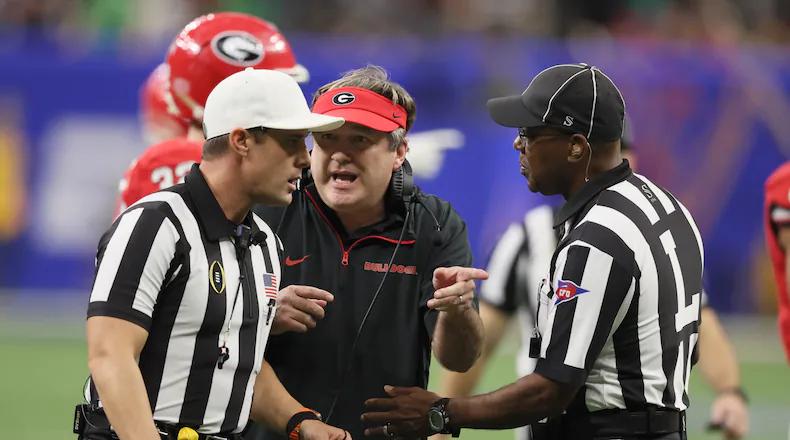The recent Sugar Bowl brought intense scrutiny on a substitution play executed by Notre Dame against the Georgia Bulldogs.
This incident has sparked debate among coaches, players, and fans.
After the game, Georgia’s head coach, Kirby Smart, claimed that the substitution was illegal.
He questioned its legality based on what he was told by the head of officials from the SEC.
However, the SEC confirmed the legality of this play, clarifying the rules around substitutions.
The Substitution Play Explained
In a vital moment during the game, Notre Dame lined up for a punt on a fourth down situation.
Then, just as the play was about to commence, every member of the punt team swiftly left the field.
They were promptly replaced by the Fighting Irish offense. This strategic move left the Georgia defense scrambling.
In their effort to readjust, Georgia ended up jumping offsides.
This mistake allowed Notre Dame a crucial first down that significantly helped their game strategy.
Kirby Smart’s Reaction
Coach Kirby Smart was vocal about his beliefs regarding this play being against the rules.
“Our head of officials told us you can’t run 11 on, 11 off,” he stated in his post-game comments.
This indicated Smart felt betrayed by the guidance he received and thought it directly impacted the game’s outcome.
SEC’s Official Stance
In response to Smart’s claims, the SEC clarified the situation.
According to SEC coordinator of football officials, John McDaid, pulling the entire punt team off the field during an official timeout is permissible.
This new information highlighted that Notre Dame’s specific execution of the play was within the rules.
After an official’s timeout, all substitutions are allowed, thereby making the play legal.
Understanding Officiating Rules
Substitution rules in college football are crucial in maintaining fair play.
Typically, a complete substitution when play is still ongoing violates the rules.
However, conditions like injuries or official timeouts allow teams to make full substitutions.
Misunderstanding these rules can lead to significant confusion during critical plays in big games.
The Importance of Official Timeouts
Official timeouts are key moments in the game.
They allow teams the chance to substitute players without penalties.
In this case, Notre Dame’s opportunity came from a timeout for a replay review.
Conditions are set where substitutions become crucial for game strategy.
Impact on the Game
The implications of this substitution play were immense.
Georgia made mistakes during the game, culminating in a 23-10 loss.
This incident spotlighted coaching decisions as critical in shaping game outcomes.
Coaching Strategies in Critical Moments
Coaches like Notre Dame’s Marcus Freeman are always looking for ways to outsmart the competition.
By exploiting the rules, Freeman aimed to maximize his team’s potential during this tense moment.
It’s a solid reminder of how small strategies can significantly shift momentum during high-stakes games.
What This Means for Future Games
The aftermath of this play sheds light on future college football officiating.
The SEC reiterated that accurate information needs to be shared with the schools about the rules.
Remaining consistent in rule enforcement will help maintain game’s integrity across future matches.
Fan Reactions and Controversy
Fans quickly engaged in debates over this substitution play.
Many viewed Smart’s disappointment as frustration at missed opportunities by his team.
It’s an emotional moment for both sides, showcasing how deeply fans engage with these events.
FAQs
- What was the substitution play used by Notre Dame?
Notre Dame’s punt team exited the field and was replaced by the offense, leading to a crucial first down when Georgia jumped offsides. - Why did Kirby Smart believe the play was illegal?
Smart argued that he was informed by the SEC’s head of officials that such a play breach the rules. - How does an official’s timeout affect substitutions in football?
Following an official’s timeout, teams can substitute players without penalty, making all substitutions permissible. - What are the common rules for substitutions in college football?
Generally, substitutions must occur without ongoing play unless timeout conditions are met. - How will this incident influence future officiating in college football?
It emphasizes the need for clear communication on officiating rules, affecting how teams adapt and strategize in future games.









